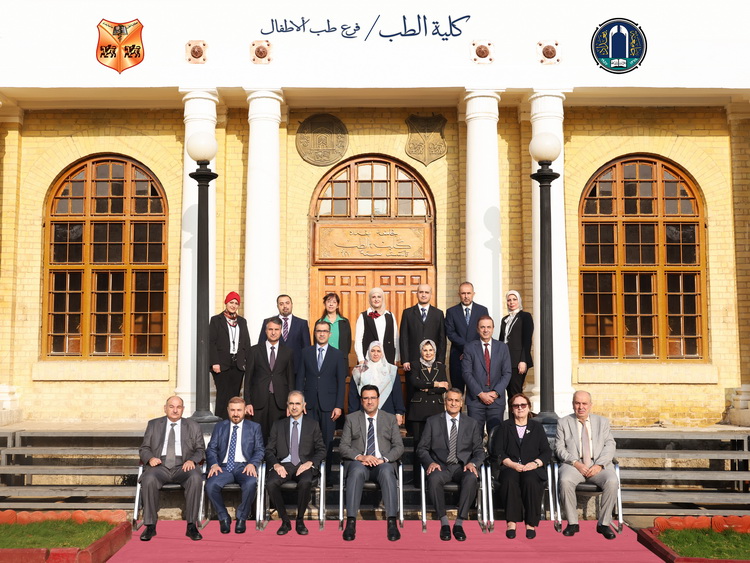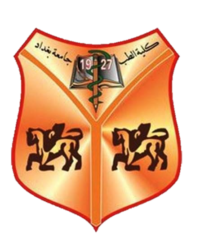
For thousands of years, doctors have taken care of the health of children as part of their treatment of all ages, children, youth and old age. Care for them increased when the Arab-Islamic society flourished, which was the most developed society in the first millennium after the birth of Christ, peace be upon him. They wrote a lot about their diseases and caring for them in specialty books.
The science of Pediatrics expands, so it includes, in addition to the diseases that affect them, the maintenance of physical, mental, and social health, and prevention of diseases, especially by giving vaccines and preventing accidental or intentional injuries.
Caring for the children of Iraq and treating them was one of the duties of the general and internists doctors until the return of the first batch of doctors after they received modern sciences in the capital of the Ottoman Empire and some countries of emerging Europe and established the Baghdad Medical Association in 1925, which later turned into the Iraqi Medical Association, which had the great impact in establishing the Royal Medical College in 1927.
Pediatrics started as an independent science and specialized practice in the early thirties of the 20th century and contributed to the establishment of the Children's welfare Society to consolidate and develop this practice and work to raise the profile of the profession and improve preventive health care for the children of Iraq and benefit from global development and experience of their colleagues in other countries, when the Iraqi Pediatric Society was established in 1967 and was one of the first medical societies in Iraq after the Iraqi Medical Society.
The Law of Hammurabi (1728-1686) B.C came out, including provisions for the protection of children and captives, with provisions for the execution of child kidnappers and the punishment of mothers who fail to take care of children, and the first to write a separate book on pediatrics was Abu Bakr al-Razi (865-925) AD who was the chief physician at (Pimaristan) Baghdad hospital, the first to distinguish between smallpox and measles and to describe the symptoms of severe measles.
But in the modern era, specifically in the 20th century, Dr. Abdullah Qaseer was the first to specialize in the practice of pediatrics in Mosul, who graduated from the American University in Beirut in 1934 and trained in pediatrics in London, then returned to Iraq to open the department of Pediatrics at the Royal Hospital in Baghdad in 1935, then moved to the first children's hospital established by the Children's Welfare Society in Bab al-Muadam in 1936, which had thirty beds and then expanded to become the main hospital for the treatment of children in Baghdad / Al-Rasafah until the opening of the new Children's Welfare Hospital in Medical city 1984 which continued to be the main tertiary level center for diagnosis and treatment of pediatric cases from Baghdad and other parts of Iraq to date.
Dr. Abdulla Qaseer was the first professor to teach pediatrics at the Royal Iraqi Medical College.
Dr. Abdul Ameer Allawi was the second faculty member joined the department in 1936 followed by Dr Salih Al-Bassam & Dr. Ihsan Doghramagi in 1940.
In the middle of the 1950s, Dr. Lamaan Amin Zaki and Dr. Salman Taj al-Din joined the dept. of Pediatrics followed by Dr. Adnan Shaker Faraj.
In the mid-1970s, Dr. Louay Al-Nouri joined the teaching team, followed by Dr. Muhammad Al-Hassani, then this group of five faculty members moved to the New Medical City building, 10th floor when it was opened in 1970, since then diploma study in pediatrics was established for the first time in Iraq, which continued to graduate general pediatricians annually to meet the country’s need for the specialty itself until it’s suspension in 2007.
The fellowship of the Arab Board for Medical Specializations in Pediatrics was introduced in 1982, and the first batch graduated in 1986. The Iraqi Board for Medical Specializations fellowship was introduced in the early nineties of the last century, both Arab and Iraqi Councils continued to provide the country with the specialty of pediatrics to date
Subspecialty fellowships were introduced in various pediatric specialties, as follows:
- Congenital heart diseases in children Subspecialty Fellowship
- Hematology and Oncology Subspecialty fellowship and single- track study
- Nephrology Subspecialty Fellowship
- Diseases of Prematurity and Newborns Subspecialty Fellowship
- Endocrinology Subspecialty Fellowship
- Neurology Subspecialty Fellowship
- Gastroenterology Subspecialty Fellowship
- Metabolic Diseases Subspecialty Fellowship
- Respiratory disease subspecialty fellowship
The Pediatrics core curriculum provides exposure to many aspects of primary care.
The goals of Pediatrics syllabus are to foster:
- Acquisition of basic knowledge of growth & development (physical, physiologic, and psychosocial) and its clinical application from birth to infancy.
- Gain the knowledge necessary for the diagnosis and initial management of common acute and chronic Pediatric diseases.
- Develop competency in physical examination of infants, children, and adolescents.
Academic Staff – Department of Pediatrics
For a complete and regularly updated list of faculty members in the Pediatrics department, please visit the University of Baghdad Pediatrics Repository .

